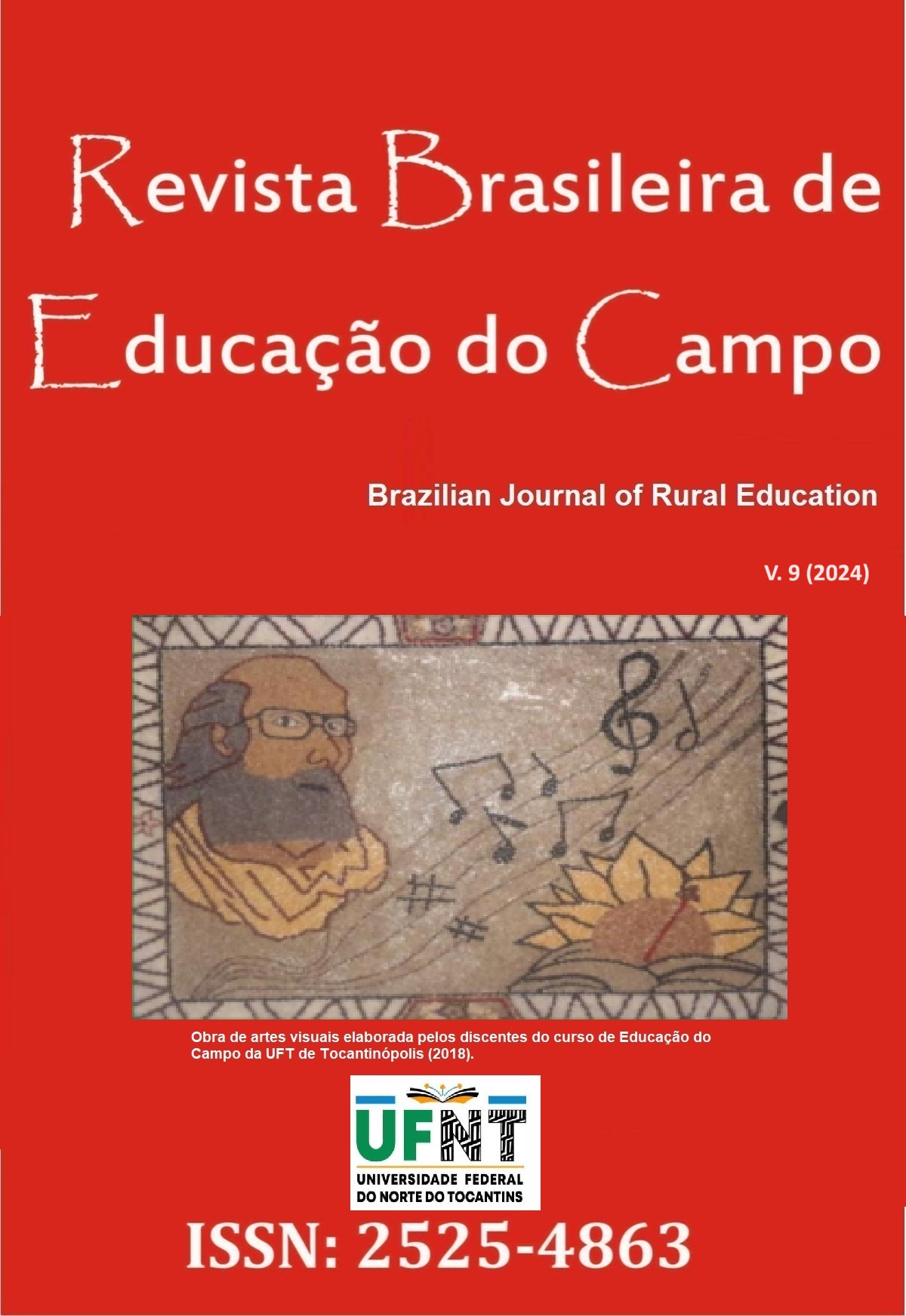Contributions of the Methodology of Narrative Productions to understanding the educational processes developed by educators from a rural school in the municipality of Carangola – MG
DOI :
https://doi.org/10.70860/ufnt.rbec.e15404Résumé
ABSTRACT. This research used the Methodology of Narrative Productions (MNP) to understand how the experiences evidenced by the educators' narratives can contribute for the development of pedagogical practices articulated to the principles of the Rural Education. In methodological terms, we carried out three narrative interviews with rural educators who worked in a rural school in the city of Carangola – MG based on the assumptions of the MPN. The data indicated the existence of different experiences acquired by each educator who participated in this research, throughout their life, school and/or professional trajectory that put them in contact with the rural people. Among other issues, the narratives showed that all participants indicated developing educational processes articulated to the cultures, knowledge, and ways of life of rural people. However, in these analyses we found that the articulation depends exclusively on each educator, as there is no policy and/or guidance from school management and/or the municipal government that encourages such practices.
Téléchargements
Références
André, M. (1984). Estudo de caso: seu potencial na educação. Cadernos de Pesquisa, 49, 51-54. Recuperado de: http://publicacoes.fcc.org.br/ojs/index.php/cp/view/1427
Arroyo, M. G. (2012). Diversidade. In Caldart, R. S., Pereira, I. B., Alentejano, P., & Frigotto, G. (Orgs.). Dicionário da Educação do Campo (pp. 231-238). Rio de Janeiro, São Paulo: Expressão Popular.
Arroyo, M. G. (2007). Políticas de Formação de educadores (as) do Campo. Cadernos Cedes, 27(72), 157-176. https://doi.org/10.1590/S0101-32622007000200004 DOI: https://doi.org/10.1590/S0101-32622007000200004
Bahthin, M. (1981). Marxismo e Filosofia da Linguagem. São Paulo: Hucitec.
Balasch, M., & Montenegro, M. (2003). Una propuesta metodológica desde la epistemología de los conocimientos situados: las producciones narrativas. Encuentros en Psicología Social, 1(3), 44-48.
Caldart, R. S. (2015). Sobre a especificidade da Educação do Campo e os desafios do momento atual [Mimeo]. Porto Alegre, RS.
Caldart, R. S. (2009). Educação do Campo: notas para uma análise de percurso. Trabalho, Educação e Saúde, 7(1), 35-64. https://doi.org/10.1590/S1981-77462009000100003 DOI: https://doi.org/10.1590/S1981-77462009000100003
Caldart, R. S. (2008). Sobre Educação do Campo. In Santos, C. A. (Org.). Educação do Campo: campo – políticas públicas – educação (pp. 67-86). Brasília, DF: Incra, MDA.
Fernandes, B. M., & Molina, M. C. (2004). O Campo da Educação do Campo. In Molina, M. C., & Jesus, S. M. S. A. (Orgs.). Por uma Educação do Campo: Contribuições para a construção de um projeto de educação do campo (pp. 53- 89). Brasília, DF: Articulação Nacional “Por uma Educação do Campo”.
Goikoetxea, I. G. (2014). Tensiones y distensiones en torno a las relaciones de poder en investigaciones feministas con Producciones Narrativas. Quaderns de Psicologia, 16(1), 127-140. https://doi.org/10.5565/rev/qpsicologia.1210 DOI: https://doi.org/10.5565/rev/qpsicologia.1210
Lüdke, M., & André, M. E. D. A. (1986). Pesquisa em educação: abordagens qualitativas. São Paulo: EPU.
Molina, M. C., & Antunes-Rocha, M. I. (2014). Educação do Campo: história, práticas e desafios no âmbito das políticas de formação de educadores–reflexões sobre o PRONERA e o PROCAMPO. Revista Reflexão e Ação, 22(2), 220-253. https://doi.org/10.17058/rea.v22i2.5252
Monclus, P. G. (2011). Terapia Ocupacional: Una disciplina para la autonomía. Prácticas y discursos de Gubernamentalidad y subjetivación en torno a una ciencia emergente (Tesis de Doctorado). Universidad Autónoma de Barcelona, Barcelona.
Montenegro, M., & Pujol, J. (2003). Conocimiento Situado: Un Forcejeo entre el Relativismo Construccionista y la Necesidad de Fundamentar la Acción. Revista Interamericana de Psicologia, 37(2), 295-307.
Rosa, D. S., & Caetano, M. R. (2008). Da educação rural à educação do campo: uma trajetória... Seus desafios e suas perspectivas. Colóquio, 6(1-2), 21-34.
Souza, M. A. (2008). Educação do Campo: políticas, práticas pedagógicas e produção científica. Educação & Sociedade, 29(105), 1089-1111. https://doi.org/10.1590/S0101-73302008000400008 DOI: https://doi.org/10.1590/S0101-73302008000400008
Vendramini, C. R (2007). Educação e Trabalho: reflexões em torno dos Movimentos Sociais do Campo. Cadernos Cedes, 27(72), 121-135. https://doi.org/10.1590/S0101-32622007000200002 DOI: https://doi.org/10.1590/S0101-32622007000200002
Vighi, C. S. B. (2012). Inserção de professores urbanos em escolas do/no campo. In Anais do I Seminário Internacional e I Fórum de Educação do Campo da Região Sul do RS (pp. 1-17). Pelotas, RS.
Téléchargements
Publié-e
Comment citer
Numéro
Rubrique
Licence
© Diego Gonzaga Duarte da Silva, Elizete Oliveira de Andrade, Maria Solange Feliciano Galvão Aguiar 2024

Cette œuvre est sous licence Creative Commons Attribution 4.0 International.
Proposal for Copyright Notice Creative Commons
1. Policy Proposal to Open Access Journals
Authors who publish with this journal agree to the following terms:
A. Authors retain copyright and grant the journal right of first publication with the work simultaneously licensed under the Creative Commons Attribution License that allows sharing the work with recognition of its initial publication in this journal.
B. Authors are able to take on additional contracts separately, non-exclusive distribution of the version of the paper published in this journal (ex .: publish in institutional repository or as a book), with an acknowledgment of its initial publication in this journal.
C. Authors are permitted and encouraged to post their work online (eg .: in institutional repositories or on their website) at any point before or during the editorial process, as it can lead to productive exchanges, as well as increase the impact and the citation of published work (See the Effect of Open Access).














